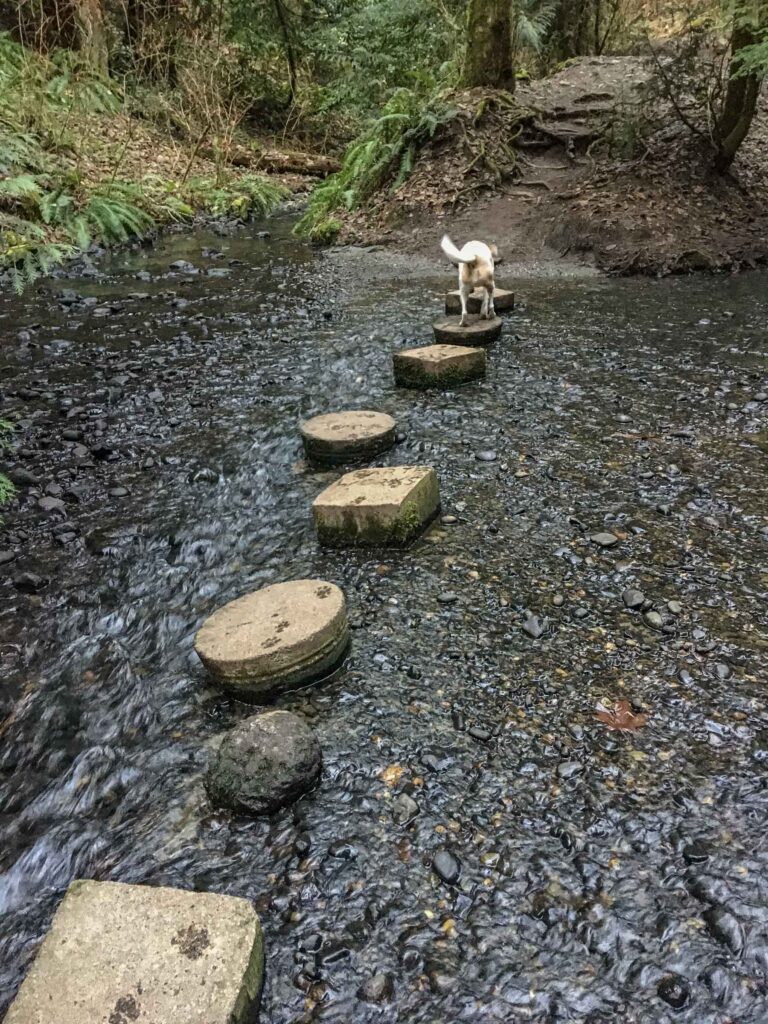Last week a client asked me which feels more daunting: climbing Mt. Rainier or helping our only child get ready to start college next month. To me, Mt. Rainier feels way easier. Perhaps it has more to do with the fact that I’ve reached the summit eight times. It’s familiar, predictable, and finite. Launching a college student is a once-in-a-lifetime milestone we will never experience again. It’s had its ups and downs over the past eighteen years, and we never found the parenting user’s manual. So many things can — and probably will — still go wrong. As my roles as an author, coach, and parent collide in spinning turmoil, my role is to let go of the need to control.

Who Has a Need to Control?
As I ponder my various roles, I ask myself: which one has a need to control? The answer: all of them. But knowing that, I can work to change it.
Authors
Authors need to design every aspect of their story. In a way, they’re playing God, throwing rocks at their protagonist and giving them increasingly difficult challenges. They may have control over their characters and the worlds they create. But as soon as they look for an editor, agent, and publishing house, everything changes. They have control over one thing: the process of creating. But ultimately, the one in control of reading what’s published is the reader.

Coaches
Coaches try to help their clients by providing detailed workouts, guidance, and moral support. We introduce clients to helpful resources and effective strategies for getting to their goals. But when clients miss a workout, get sick or injured, become overworked, or lose interest, we realize the truth: coaches are not in control; the client is. Coaches only have control over what they bring to the relationship.
Parents
Parents try to ensure that no harm comes to their offspring, sometimes stepping in when they should let their child struggle. I’ve been asking myself, “What challenges will she face? Have we prepared her well enough to handle them? How often will she have to fall flat on her face before she is independent?” (The answer, if I sit still long enough to listen to inner wisdom, is “As often as it takes.”) Our role is changing from provider and protector to collaborator and advisor. We are no longer in control of her choices; she is. And really, hasn’t it been that way for some time now?

The Illusion of Control
Dr. Seuss said, “Only you can control your future.” By that, I think he meant we are the only ones who can take strides in whatever we feel is the right direction at the time. Others suggest that control is an illusion. And Napoleon Hill is quoted as saying, “You either control your mind or it controls you.” How do we wrap our heads around the fact that so much is out of our control?
By focusing on those few aspects we do — like our thoughts, our behaviors, our actions — and minimizing the impact of those we don’t, such as weather, what others think of us, and other people’s actions.
Whenever I feel the overwhelming need to control some aspect of my writing, my clients’ workouts, or my daughter’s life, I take deep breaths and remind myself that I’m doing the best I can with the tools available to me. And I erase the need to be perfect.
I keep reminding myself of my resolution post on kisage (Keep It Simple And Good Enough) from January. We have done enough, and anywhere we haven’t, she’ll learn more quickly than if we do it for her. I’ve added the catchy phrase, “Let go, let it be good.” (For the second phrase, I’ve replaced the popular “let God” with what works for me.)

Additional Resources
Instead of trying to control everything, I like to remind myself of tips from the following posts on CourtSchurmanGo.com:
- Befriending our inner critic through journaling
- Understanding, managing, and overcoming fear
- Being true to ourselves to avoid self-sabotage
- Keeping it simple and good enough
- Letting go
Fear is a normal aspect of life, but we don’t need to let it RULE our lives. We can prepare ourselves, our clients, our families, and our colleagues the best we can. A year ago I posted about letting go of my daughter; by being self-compassionate today I can recognize that this process will likely take several more years. We can be curious about what our inner critic teaches us without letting it dominate. And we can stick to our own moral compass, so we can do the very best we can. Then let go, and let it be good.


Such a critical element of our lives, this “need” to control! I will stay away from commenting on it in the context for letting a loved child go into the world; my own daughter will soon turn 42 and any illusion of having control over her life has long dissipated 🙂
But the “need” (“want”?) to control, of course, goes far beyond our job as a parent. As you point out when considering your other jobs, control only exists when it comes to controlling ourselves… but we yearn for so much more! As I can’t draw from my long forgotten parenting experience, I will default to my Hiking/Backpacking passion to share some of my observations. I wish I had full control over: the weather, the quality of the campsites available to me, the flawless performance of all my equipment, the friendliness of others I meet on the trail, my aging body’s ability to handle the repeated stress/efforts… the list goes on and on. Once it became clear to me that I could not guarantee success in ANY of these areas, I had to progressively replace “being in control” with (1) EMBRACING UNCERTAINTY and (2) BUILDING RESILIENCE. In the context of an outdoors adventure, it actually seems quite natural (pun semi-intended) to make uncertainty an integral part of the experience; how fulfilling would an adventure/challenge be if I did not have to face not just the unexpected but also the unwelcome? Is a “Stepford” Hike worthwhile? For example, during my last long distance hiking trip, I had to deal with aggressive mosquitoes about 80% of the time; I had to face a series of mild to moderate body pains (blisters, artificial hip soreness, shin splints); I also had to manage the fact that there was heavy traffic on the trail.. and at campsites. Years ago, these would have eroded my motivation; after reprogramming my mind to a more “ludic” approach, I now receive these as a videogame player would approach a new obstacle, a new riddle, a new foe to prevail over in order to “reach the next level” (continue the adventure). Gamifying these challenges seems to keep my mind open and better prepared to find ways to deal with them. In fact, I also reprogrammed myself to have a Pavlovian reaction to these unwelcome surprises: I force myself to smile and/or laugh before doing anything else, before proceeding with the next steps (i.e. “dealing with the problem”). This positive conditioning (proactively welcoming obstacles, or even HOPING they will surface) appears to make me much more effective at solving problems along the way. To maximize the odds of my being successful, I also need to build up my RESILIENCE; being very positive and totally unprepared would not put me in an ideal position 🙂 To build resilience (“ability to recover from or adjust easily to misfortune or change” – Merriam Webster) I had to develop a combination of effective PLANNING and INSTANT FOCUS conditioning. Planning takes many forms, but the most essential ones in my case are (1) Learning as much as I can about what I may face and (2) Procuring and becoming familiar with the necessary equipment/artifacts/expert contacts. I can then start on my journey with this “body of knowledge” at my fingertips. When a “disruptive event” does occur, and I am in a situation where I can deal with it, I try and switch my mind to “Instant Focus” which is a small series of steps such as (a) confirm that the event needs to be dealt with, (b) take these proverbial deep breaths to calm any “fight of flight” automatic reaction, (c) recognize and embrace the fact that this is “part of the game” (smile, laugh, feed positive vibes to my brain), and (d) find and use the “tools/skills” I have acquired through planning and learning, as appropriate to deal with the specific event. This does not guarantee success but, in most occasions, it ensures that I can be confident I did my best to try and address the issue at hand. Going from HAVING CONTROL to being CONFIDENT I DID MY BEST seems to have defused a lot of the stress related to uncertainty… and has also produced better results in “real life” situations.
Gerard, I could not have said it any better. Quoting a children’s book I stumbled across on my recent travels to Alaska, I found, “Every problem has an opportunity for something good. You just have to look for it.” Keeping an open mind, a sense of humor, and a willingness to meet others and learn from them (whether people or experiences) are great things to keep in mind. Bravo.